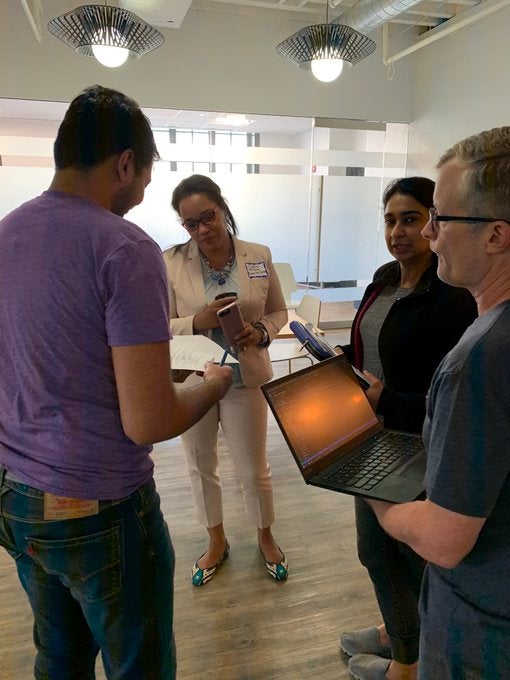Building a Bridge Between Communities and Institutions of Power
November 6, 2019 | By Vandhana Ravi
Working within a large, academic establishment, it is hard to ignore that we live in an era of cynicism. You can almost smell the distrust in our institutions of power in the drafty libraries and sweaty hallways. This shouldn’t be surprising; according to a Pew Research study, 75% of Americans believe that their trust in government is declining and perhaps even scarier, 64% of Americans believe their trust in each other has been shrinking as well. What hasn’t wavered, despite the depth of American skepticism, is our belief in the power of our communities to lead the charge in revitalizing our institutions from the bottom up. This value of service and civic participation is what drives the National Day of Civic Hacking, a movement organized seven years ago and hosted annually by Code for America.
The National Day of Civic Hacking brings together coders, technologists, and designers with policymakers, lawyers, advocates, students, and regular community members to put their heads together and help local governments provide better services for everyone. This year’s event on Sept. 21, 2019 was in partnership with National Expungement Week and focused on the record clearance process by teaming local brigades with expungement clinics and criminal justice lawyers. Our local Code for DC brigade partnered with the Rising for Justice Expungement Clinic, which is one of the only places in Washington, D.C. where anyone with a criminal record will be provided free legal counsel and representation to seal their criminal record, which makes their record inaccessible to the public without a court order.
The legal levers of record sealing and expungement can be powerful tools for restorative justice. It helps aid economic empowerment by removing barriers of access in obtaining a new job, finding a home, applying for a loan, or even accessing higher education programs. Having your record sealed can also be mentally healing as it provides a clean slate and the confidence to embrace a new beginning. The Code for DC team’s focus for the day was to develop a web form, as part of a larger Expungement Eligibility Guide app, that would automate the tedious and labor-intensive documentation process for the Rising for Justice lawyers, giving them more time to spend on providing services to exponentially more clients. The hope is that the web form (and the app as a whole) will help the Rising for Justice team seal more records, with the same resourcing and staff.

As someone who works within a traditional educational institution, I was amazed by how much this event was also a space for civic learning and digital literacy. Throughout the day, there was a lot of space intentionally created for both formal and informal moments of education around the legal frameworks of expungement in D.C., the histories of D.C.’s neighborhoods and its politics or even the poetic metaphors of the interface of Github, the collaborative coding website used to manage the project. A lot of this stemmed from the variety of people in the room: from stay-at-home moms to professional content designers to high school students. Their commitment to civic participation and bravery in embedding their perspectives into the project and this movement as a whole is what makes it so powerful.
The team’s emphasis on education and commitment was a reminder that this event was not just a once-a-year event, and instead, a call-to-action for all of us to be more thoughtful and deliberate in how we engage in, with, and for our communities as well as our institutions of power. And while there are many paths to civic change, here are a few ways to get us all started:
- Get to know your local officials and representatives
It is important to know who our elected officials and what they stand for. We should make sure to have our voices and opinions heard about legislation and policy in our communities. Here is a great tool that provides a script to read on these calls based on various issues. - Census 2020
The Census is the bedrock of our democracy and the 2020 Census is going to be our first-ever digital census. This is our opportunity to ensure that we get as accurate and representative of a count as we can. Here are some ways we can help make that happen. - Check out your local Code for America brigade
The Code for America brigades are “a national alliance of community organizers, developers, and designers that are putting technology to work in service of our local communities”. Their meetups are open for anyone to join, regardless of knowledge about software code. The Code for DC team meets weekly on Wednesdays. Joining their Slack team is a great way to get started. - Get involved with your local community organizations
Democracy building happens in our communities every day and with each one of us that joins in, the stronger our entire communities become. Whether it’s volunteering with the local library, organizing for affordable housing, or serving at a local free clinic, there are so many community organizations powered by volunteers that are always looking for more support.